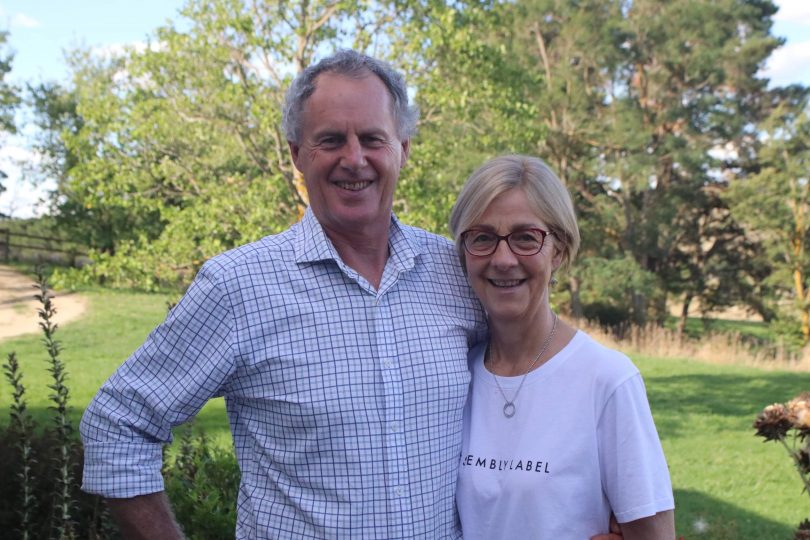
Charlie and Kris Prell at their property Gundowringa in the Southern Tablelands. Photo: Supplied.
It started in 2000 when, two years after the east coast’s first wind farm Crookwell 1 was commissioned, fifth-generation sheep farmer Charlie Prell started planning for the transformation of Australia’s arable land to renewables.
At Gundowringa in the Southern Tablelands, in the heart of sheep farming country, Charlie is one of four farmers hosting the 28-turbine Crookwell 2 Wind Farm.
Charlie is synonymous with the movement behind renewable energy uptake in the agricultural sector. He has collaborated with farmers as operations expand in south-eastern NSW, primarily through advocacy, converting the massive installation of infrastructure into profits to be put back into farming operations and the local community.
Farmers are ready for change, says Charlie.
“Climate change is not a threat that is in the future. It is here now.
“The weather systems will become more intense as the atmosphere warms. This means more frequent, prolonged and intense droughts, more intense, but less frequent rainfall events, out of season and severe frosts, both hotter and colder weather systems and much more,” he says.
“The CSIRO and BOM have been saying this is coming for decades and it is here now. The planet has warmed about 1.1 degrees and we are not going to keep this below 1.5 degrees with the current attitude of the Australian and other governments around the world to not follow the scientific advice in relation to the threat.”
Charlie is chairman of the Farmers for Climate Action (FCA), a group that represents about 6000 farmers nationwide working to ensure they are part of the solution to climate change.
He has backed the call for changes to legislation to reflect the Morrison government’s net-zero by 2050 commitments and reviews of the economic impact on regional communities every five years starting from 2030.
The FCA says emissions need to be cut in the next decade.
“Our ability to achieve this target will be entirely determined by what happens between now and 2030,” he says.
“This will be largely determined by the amount of fossil fuel (coal, oil and gas) that is burnt.”
They also want the rapid scaling up of existing programs such as the Carbon and Biodiversity Pilot and Enhanced Remnant Vegetation Pilot.
Under both pilots, farmers are rewarded for planting, managing and improving biodiversity on farms.
“We are sequestering carbon in trees on farms, reducing our methane emissions through working on feed additives, hosting renewables, using ‘regenerative’ agricultural practices to sequester carbon in soils, enhancing biodiversity on farms with exclusion fencing and properly remunerated management of these sensitive areas,” he says.
“FCA is running a series of ‘fellowships’ for farmers to assist them to become climate literate and to educate them about options to make their farms more resilient in the face of the weather patterns that are already rapidly changing due to climate change. Most of these options involve sequestering carbon on farms through changes in management practices.”
Further, Charlie says introducing new legislation would ensure that communities benefit from large-scale renewable energy infrastructure, including solar panels or wind turbines.
“Hosting wind turbines and large-scale solar panels gives farmers a drought-proof income that can (and does) enhance their financial viability, ecological and environmental management of their land. It also improves the economies of regional towns such as Crookwell as the money flows through hosts’ pockets into local rural suppliers.
“In addition, the improved cash flow leads to permanent employment opportunities for locals,” he says.
“This would be taken to a new level of engagement and local support if the Government adopted the Local Power Agency Bill that is currently sitting on the table in the Australian Parliament since it was introduced by the Independent member for Indi, Helen Haines, in February 2021.”
However, the real clincher for the climate is Australia’s fossil fuel addiction, Charlie says.
“We need to decarbonise the grid and promote the use of EV’s across the country through the roll-out of renewables and EV charging stations.”
Since its inception five years ago, the FCA has seen a growing number of farmers joining the movement.
“We have seen a dramatic change in attitudes from farmers and regional Australians to the threat of climate change,” says Charlie.
“This shift in attitudes has been particularly noticeable since the very intense drought of 2015-19, the bushfires that ravaged eastern Australia for more than half of 2019, the intense flooding events that have occurred since then, and now the intense storms that are hitting regions with increasing regularity.
“Farmers across Australia who are very concerned about the situation they are being put in, all of these people, like me, are committed to doing something about this.”







